Exponential Laws of
Computing Growth
Bias in
Technology
Artificial
Intelligence:
Think Again
Cell-Graphs
Deploying SDN
in the Enterprise
Technology for
the Most Effective
Use of Mankind
COMMUNICATIONSOF THE ACMCACM.ACM.ORG 01/2017 VOL.60 NO.01Association for Computing Machinery�
Sponsored by
SIGOPS
In cooperation with
Platinum sponsor
Gold sponsors
Sponsors
Paper submission deadline: February 22, 2017
Paper acceptance notification: March 29, 2017
Poster submission deadline: March 22, 2017
We invite you to submit original and innovative papers, covering all
aspects of computer systems technology, such as file and storage
technology; operating systems; distributed, parallel, and cloud
systems; security; virtualization; and fault tolerance, reliability, and
availability. SYSTOR 2017 accepts full papers, short papers, and
posters.
Program chairs
Peter Desnoyers, Northeastern
University
Eyal de Lara, University of Toronto
General chair
Doron Chen, IBM Research
Posters chair
Adam Morrison, Tel Aviv University
Steering committee head
Michael Factor, IBM Research
Steering committee
Ethan Miller, University of California
Santa Cruz
Liuba Shrira, Brandeis University
Dan Tsafrir, Technion
Dalit Naor, IBM Research
Erez Zadok, Stony Brook University
www.systor.org/2017/
�
Inviting Young
Scientists
Meet Great Minds in Computer
Science and Mathematics
As one of the founding organizations of the Heidelberg Laureate Forum
http://www.heidelberg-laureate-forum.org/, ACM invites young computer
science and mathematics researchers to meet some of the preeminent scientists
in their field. These may be the very pioneering researchers who sparked your
passion for research in computer science and/or mathematics.
These laureates include recipients of the ACM A.M. Turing Award, the Abel Prize,
the Fields Medal, and the Nevanlinna Prize.
The Heidelberg Laureate Forum is September 24–29, 2017 in Heidelberg, Germany.
This week-long event features presentations, workshops, panel discussions, and
social events focusing on scientific inspiration and exchange among laureates
and young scientists.
Who can participate?
New and recent Ph.Ds, doctoral candidates, other graduate students
pursuing research, and undergraduate students with solid research
experience and a commitment to computing research
How to apply:
Online: https://application.heidelberg-laureate-forum.org/
Materials to complete applications are listed on the site.
What is the schedule?
Application deadline—February 14, 2017.
We reserve the right to close the application website
early depending on the volume
Successful applicants will be notified by end of March/early April 2016.
More information available on Heidelberg social media
PHOTOS: ©HLFF / B. Kreutzer (top);
©HLFF / C. Flemming (bottom)
�
COMMUNICATIONS OF THE ACM
Departments
News
Viewpoints
5
7
9
Editor’s Letter
Technology for the Most
Effective Use of Mankind
By Moshe Y. Vardi
From the President
The ACM Future
of Computing Academy
By Vicki L. Hanson
Cerf’s Up
Information and Misinformation
on the Internet
By Vinton G. Cerf
10 BLOG@CACM
How We Teach CS2All, and
What to Do About Database Decay
Valerie Barr considers how to
make computer science education
meaningful and relevant to all,
while a team from the Massachusetts
Institute of Technology Computer
Science and Artificial Intelligence
Laboratory offers strategies to
counter database decay.
25 Calendar
105 Careers
Last Byte
112 Upstart Puzzles
Open Field Tic-Tac-Toe
By Dennis Shasha
22 Technology Strategy and Management
Is Google’s Alphabet a Good Bet?
A relatively simple query raises
myriad complicated issues.
By Michael A. Cusumano
26 Law and Technology
Why Less Is More When It Comes
to Internet Jurisdiction
Considering legal uncertainty
in the online environment.
By Michael Geist
29 Historical Reflections
Colossal Genius: Tutte, Flowers,
and a Bad Imitation of Turing
Reflections on pioneering
code-breaking efforts.
By Thomas Haigh
36 Viewpoint
Artificial Intelligence: Think Again
Social and cultural conventions
are an often-neglected aspect of
intelligent-machine development.
By Jerry Kaplan
39 Viewpoint
Effects of International Trafficking
in Arms Regulations Changes
Considering the impact of recent
ITAR changes to the U.S. software
industry and software education.
By Jeremy Straub
13
13 Pure Randomness Extracted from
Two Poor Sources
Developments from several disparate
areas of computer science provide
“a huge jump, both technically
and also quantitatively.”
By Don Monroe
16 Mapping the Internet of Things
Researchers are discovering
surprising new risks across
the fast-growing IoT.
By Alex Wright
19 Bias in Technology
As leading companies release
troubling diversity statistics,
experts search for solutions.
By Gregory Mone
Association for Computing Machinery
Advancing Computing as a Science & Profession
2 COMMUNICATIONS OF THE ACM | JANUARY 2017 | VOL. 60 | NO. 1
T
R
E
L
I
T
N
A
D
Y
B
E
G
A
M
I
�
01/2017
VOL. 60 NO. 01
Practice
Contributed Articles
Review Articles
74 Cell-Graphs: Image-Driven Modeling
of Structure-Function Relationship
Cell-graph construction
methods are best served when
physics-driven and data-driven
paradigms are joined.
By Bülent Yener
Watch the author discuss
his work in this exclusive
Communications video.
http://cacm.acm.org/videos/
cell-graphs
42
66
Research Highlights
54 Exponential Laws
86 Technical Perspective
of Computing Growth
Moore’s Law is one small component
in an exponentially growing
planetary computing ecosystem.
By Peter J. Denning and Ted G. Lewis
Watch the authors discuss
their work in this exclusive
Communications video.
http://cacm.acm.org/
videos/exponential-laws-of-
computing-growth
66 Bottom-Up Enterprise Information
Systems: Rethinking the Roles
of Central IT Departments
Central IT needs to guide
functional areas and departments
toward effective operational
and procurement practices.
By Cecil Eng Huang Chua
and Veda C. Storey
Magnifying Motions the Right Way
By Richard Szeliski
87 Eulerian Video
Magnification and Analysis
By Neal Wadhwa, Hao-Yu Wu,
Abe Davis, Michael Rubinstein,
Eugene Shih, Gautham J. Mysore,
Justin G. Chen, Oral Buyukozturk,
John V. Guttag, William T. Freeman,
and Frédo Durand
96 Technical Perspective
Mapping the Universe
By Valentina Salapura
97 HACC: Extreme Scaling
and Performance Across
Diverse Architectures
By Salman Habib, Vitali Morozov,
Nicholas Frontiere, Hal Finkel,
Adrian Pope, Katrin Heitmann,
Kalyan Kumaran,
Venkatram Vishwanath,
Tom Peterka, Joe Insley, David Daniel,
Patricia Fasel, and Zarija Lukic´
42 Resolving Conflict
Don’t “win.” Resolve.
By Kate Matsudaira
45 Faucet: Deploying SDN
in the Enterprise
Using OpenFlow and DevOps
for rapid development.
By Josh Bailey and Stephen Stuart
50 Research for Practice:
Web Security and
Mobile Web Computing
Expert-curated guides
to the best of CS research.
Articles’ development led by
queue.acm.org
L
A
O
M
E
L
R
E
I
V
I
L
O
;
A
K
D
O
G
A
J
Y
B
S
E
G
A
M
I
About the Cover:
Peter Denning and Ted
Lewis take a new look
at Moore’s Law and the
causes of exponential
growth for information
technologies and find there
is much more life left in
the landmark observation.
Cover illustration by Peter
Crowther Associates.
JANUARY 2017 | VOL. 60 | NO. 1 | COMMUNICATIONS OF THE ACM 3
�
ACM, the world’s largest educational
and scientific computing society, delivers
resources that advance computing as a
science and profession. ACM provides the
computing field’s premier Digital Library
and serves its members and the computing
profession with leading-edge publications,
conferences, and career resources.
Executive Director and CEO
Bobby Schnabel
Deputy Executive Director and COO
Patricia Ryan
Director, Office of Information Systems
Wayne Graves
Director, Office of Financial Services
Darren Ramdin
Director, Office of SIG Services
Donna Cappo
Director, Office of Publications
Scott E. Delman
ACM COUNCIL
President
Vicki L. Hanson
Vice-President
Cherri M. Pancake
Secretary/Treasurer
Elizabeth Churchill
Past President
Alexander L. Wolf
Chair, SGB Board
Jeanna Matthews
Co-Chairs, Publications Board
Jack Davidson and Joseph Konstan
Members-at-Large
Gabriele Anderst-Kotis; Susan Dumais;
Elizabeth D. Mynatt; Pamela Samuelson;
Eugene H. Spafford
SGB Council Representatives
Paul Beame; Jenna Neefe Matthews;
Barbara Boucher Owens
BOARD CHAIRS
Education Board
Mehran Sahami and Jane Chu Prey
Practitioners Board
Terry Coatta and Stephen Ibaraki
REGIONAL COUNCIL CHAIRS
ACM Europe Council
Dame Professor Wendy Hall
ACM India Council
Srinivas Padmanabhuni
ACM China Council
Jiaguang Sun
PUBLICATIONS BOARD
Co-Chairs
Jack Davidson; Joseph Konstan
Board Members
Ronald F. Boisvert; Karin K. Breitman;
Terry J. Coatta; Anne Condon; Nikil Dutt;
Roch Guerrin; Carol Hutchins;
Yannis Ioannidis; Catherine McGeoch;
M. Tamer Ozsu; Mary Lou Soffa; Alex Wade;
Keith Webster
ACM U.S. Public Policy Office
Renee Dopplick, Director
1828 L Street, N.W., Suite 800
Washington, DC 20036 USA
T (202) 659-9711; F (202) 667-1066
Computer Science Teachers Association
Mark R. Nelson, Executive Director
STAFF
DIRECTOR OF PUBLICATIONS
Scott E. Delman
cacm-publisher@cacm.acm.org
EDITORIAL BOARD
EDITOR-IN-CHIEF
Moshe Y. Vardi
eic@cacm.acm.org
Executive Editor
Diane Crawford
Managing Editor
Thomas E. Lambert
Senior Editor
Andrew Rosenbloom
Senior Editor/News
Larry Fisher
Web Editor
David Roman
Rights and Permissions
Deborah Cotton
Art Director
Andrij Borys
Associate Art Director
Margaret Gray
Assistant Art Director
Mia Angelica Balaquiot
Designer
Iwona Usakiewicz
Production Manager
Lynn D’Addesio
Advertising Sales
Juliet Chance
Columnists
David Anderson; Phillip G. Armour;
Michael Cusumano; Peter J. Denning;
Mark Guzdial; Thomas Haigh;
Leah Hoffmann; Mari Sako;
Pamela Samuelson; Marshall Van Alstyne
CONTACT POINTS
Copyright permission
permissions@hq.acm.org
Calendar items
calendar@cacm.acm.org
Change of address
acmhelp@acm.org
Letters to the Editor
letters@cacm.acm.org
WEBSITE
http://cacm.acm.org
AUTHOR GUIDELINES
http://cacm.acm.org/
ACM ADVERTISING DEPARTMENT
2 Penn Plaza, Suite 701, New York, NY
10121-0701
T (212) 626-0686
F (212) 869-0481
Advertising Sales
Juliet Chance
acmmediasales@acm.org
For display, corporate/brand advertising:
Craig Pitcher
pitcherc@acm.org T (408) 778-0300
Media Kit acmmediasales@acm.org
NEWS
Co-Chairs
William Pulleyblank and Marc Snir
Board Members
Mei Kobayashi; Michael Mitzenmacher;
Rajeev Rastogi
VIEWPOINTS
Co-Chairs
Tim Finin; Susanne E. Hambrusch;
John Leslie King
Board Members
William Aspray; Stefan Bechtold;
Michael L. Best; Judith Bishop;
Stuart I. Feldman; Peter Freeman;
Mark Guzdial; Rachelle Hollander;
Richard Ladner; Carl Landwehr;
Carlos Jose Pereira de Lucena;
Beng Chin Ooi; Loren Terveen;
Marshall Van Alstyne; Jeannette Wing
PRACTICE
Co-Chair
Stephen Bourne
Board Members
Eric Allman; Peter Bailis; Terry Coatta;
Stuart Feldman; Benjamin Fried;
Pat Hanrahan; Tom Killalea; Tom Limoncelli;
Kate Matsudaira; Marshall Kirk McKusick;
George Neville-Neil; Theo Schlossnagle;
Jim Waldo
The Practice section of the CACM
Editorial Board also serves as
the Editorial Board of
.
CONTRIBUTED ARTICLES
Co-Chairs
Andrew Chien and James Larus
Board Members
William Aiello; Robert Austin; Elisa Bertino;
Gilles Brassard; Kim Bruce; Alan Bundy;
Peter Buneman; Peter Druschel; Carlo Ghezzi;
Carl Gutwin; Yannis Ioannidis;
Gal A. Kaminka; James Larus; Igor Markov;
Gail C. Murphy; Bernhard Nebel;
Lionel M. Ni; Kenton O’Hara; Sriram Rajamani;
Marie-Christine Rousset; Avi Rubin;
Krishan Sabnani; Ron Shamir; Yoav
Shoham; Larry Snyder; Michael Vitale;
Wolfgang Wahlster; Hannes Werthner;
Reinhard Wilhelm
RESEARCH HIGHLIGHTS
Co-Chairs
Azer Bestovros and Gregory Morrisett
Board Members
Martin Abadi; Amr El Abbadi; Sanjeev Arora;
Michael Backes; Nina Balcan; Dan Boneh;
Andrei Broder; Doug Burger; Stuart K. Card;
Jeff Chase; Jon Crowcroft; Alexei Efros;
Alon Halevy; Norm Jouppi; Andrew B. Kahng;
Sven Koenig; Xavier Leroy; Steve Marschner;
Kobbi Nissim; Guy Steele, Jr.; David Wagner;
Margaret H. Wright; Nicholai Zeldovich;
Andreas Zeller
Association for Computing Machinery
(ACM)
2 Penn Plaza, Suite 701
New York, NY 10121-0701 USA
T (212) 869-7440; F (212) 869-0481
WEB
Chair
James Landay
Board Members
Marti Hearst; Jason I. Hong;
Jeff Johnson; Wendy E. MacKay
4 COMMUNICATIONS OF THE ACM | JANUARY 2017 | VOL. 60 | NO. 1
ACM Copyright Notice
Copyright © 2017 by Association for
Computing Machinery, Inc. (ACM).
Permission to make digital or hard copies
of part or all of this work for personal
or classroom use is granted without
fee provided that copies are not made
or distributed for profit or commercial
advantage and that copies bear this
notice and full citation on the first
page. Copyright for components of this
work owned by others than ACM must
be honored. Abstracting with credit is
permitted. To copy otherwise, to republish,
to post on servers, or to redistribute to
lists, requires prior specific permission
and/or fee. Request permission to publish
from permissions@hq.acm.org or fax
(212) 869-0481.
For other copying of articles that carry a
code at the bottom of the first or last page
or screen display, copying is permitted
provided that the per-copy fee indicated
in the code is paid through the Copyright
Clearance Center; www.copyright.com.
Subscriptions
An annual subscription cost is included
in ACM member dues of $99 ($40 of
which is allocated to a subscription to
Communications); for students, cost
is included in $42 dues ($20 of which
is allocated to a Communications
subscription). A nonmember annual
subscription is $269.
ACM Media Advertising Policy
Communications of the ACM and other
ACM Media publications accept advertising
in both print and electronic formats. All
advertising in ACM Media publications is
at the discretion of ACM and is intended
to provide financial support for the various
activities and services for ACM members.
Current advertising rates can be found
by visiting http://www.acm-media.org or
by contacting ACM Media Sales at
(212) 626-0686.
Single Copies
Single copies of Communications of the
ACM are available for purchase. Please
contact acmhelp@acm.org.
COMMUNICATIONS OF THE ACM
(ISSN 0001-0782) is published monthly
by ACM Media, 2 Penn Plaza, Suite 701,
New York, NY 10121-0701. Periodicals
postage paid at New York, NY 10001,
and other mailing offices.
POSTMASTER
Please send address changes to
Communications of the ACM
2 Penn Plaza, Suite 701
New York, NY 10121-0701 USA
Printed in the U.S.A.
COMMUNICATIONS OF THE ACMTrusted insights for computing’s leading professionals.Communications of the ACM is the leading monthly print and online magazine for the computing and information technology fields. Communications is recognized as the most trusted and knowledgeable source of industry information for today’s computing professional. Communications brings its readership in-depth coverage of emerging areas of computer science, new trends in information technology, and practical applications. Industry leaders use Communications as a platform to present and debate various technology implications, public policies, engineering challenges, and market trends. The prestige and unmatched reputation that Communications of the ACM enjoys today is built upon a 50-year commitment to high-quality editorial content and a steadfast dedication to advancing the arts, sciences, and applications of information technology.PLEASE RECYCLETHIS MAGAZINE �
editor’s letter
DOI:10.1145/3020075
Moshe Y. Vardi
Technology for the Most
Effective Use of Mankind
one online”—is either hopelessly naïve
or utterly self-serving.
Over the past decade alone we have
witnessed the demise of two prominent
techno-optimist “solutions.” The One
Laptop per Child (OLPC) project was
launched in 2005 with the goal of trans-
forming education for the world’s dis-
advantaged schoolchildren. But within
a few years “the vision was overwhelmed
by the reality of business, politics, logis-
tics, and competing interests worldwide”
(see https://goo.gl/xWj8OK). The MOOC
(massive open online courses) movement
was launched in 2011 with the rhetoric of
dramatically reducing the cost of higher
education while “reaching the quality of
individual tutoring.” But by 2014, Sebas-
tian Thrun, a MOOC pioneer, concluded
that “The basic MOOC is a great thing for
the top 5% of the student body, but not a
great thing for the bottom 95%.”
The central thesis of Toyama’s talk
was that “Technology has positive im-
pact only when amplifying social trends
or institutions that are already positively
inclined.” As much as I sympathize with
Toyama’s skeptical approach toward
techno-optimism, I find this thesis hard
to swallow. Consider, for example, Polio-
myelitis, often called polio, as an exam-
ple. Polio used to be a dreaded infectious
childhood disease, as in a small fraction
of cases the disease results in permanent
severe muscle weakness. In 1952, Jonas
Salk developed the first effective polio
vaccine, which led to drastic reduction
in polio infections (100 known cases
worldwide in 2015). Surely this counts
as technology with positive impact. Of
course one could argue the worldwide
adoption of polio vaccination required
“social trends or institutions that are al-
ready positively inclined,” but that would
make the thesis a tautology. Some social
problems do have technical solutions!
But Toyama is right that using tech-
nology to solve societal challenges re-
quires a deep understanding of the so-
cietal context, an understanding that
was not demonstrated by the OLPC
and MOOC movements. Furthermore,
deploying technology without under-
standing its societal context may have
adverse societal consequences. Consid-
er “frictionless sharing” as an example.
The concept first arose in the context of
scholarly work, where the goal was to en-
able scholars to easily share resources
with other scholars. In 2011, Zuckerberg
announced developments to Facebook
that would allow “real-time serendipity
in a frictionless experience.” By 2016,
however, frictionless sharing has given
rise to the fake-news phenomenon, with
the proliferation of websites that pub-
lish fraudulent misinformation, quickly
spread via social media, intended to
mislead readers. While it is difficult to
gauge the impact of this phenomenon
on the outcome of the 2016 U.S. presi-
dential election, the explosion of mis-
information surely counts as a negative
consequence of technology. Frictionless
sharing is technology, but to what end?
We, as computing professionals, are
engaged in the development of infor-
mation technology. This technology is
changing the world, but not always for
the better. It is time for computing to
emerge from its technological cocoon
and engage vigorously with social sci-
ence. If we wish our technology to be
developed “for the most effective use of
mankind” (quoting from Ada Lovelace’s
1843 letter to Charles Babbage), then we
need to understand mankind better!
Follow me on Facebook, Google+,
and Twitter.
Moshe Y. Vardi, EDITOR-IN-CHIEF
Copyright held by author.
JANUARY 2017 | VOL. 60 | NO. 1 | COMMUNICATIONS OF THE ACM 5
T ECHNO-OPTIMISM IS DEFINED as
the belief that technology can
improve the lives of people.
It was famously satired in
the U.S. television comedy
series “Silicon Valley,” with a startup-
company’s founders pledging to “make
the world a better place through Paxos
algorithms for consensus protocols.”
But some people take techno-optimism
very seriously. Ray Kurzweil, an accom-
plished tech innovator, described his
techno-optimistic vision in his books:
The Age of Spiritual Machines, How to Cre-
ate a Mind: The Secret of Human Thought
Revealed, and The Singularity Is Near.
In a keynote address (see https://goo.
gl/RwkwK1) at the 2016 meeting of the
Computing Research Association, Ken-
taro Toyama argued that “In spite of the
do-gooder rhetoric of Silicon Valley, it
is no secret that computing technology
in and of itself cannot solve systemic
social problems.” Toyama’s argument,
detailed at length in his 2015 book
Geek Heresy: Rescuing Social Change
from the Cult of Technology, is that per-
sistent societal challenges, such as
socio-economic inequality, do not have
technology-centric solutions. Indeed,
over the past 50 years we have witnessed
the development of the Internet, the
personal computer, the cellphone, the
Web, search engines, social media, and
smartphones—a development often
summarized as the “Information Revo-
lution.” During this period, the U.S.
poverty rate oscillated in the 13%–15%
range, completely impervious to devel-
opments in information technology. In
view of the data on poverty, the quote
attributed to Mark Zuckerberg, Face-
book’s founder and CEO—“The rich-
est 500 million [people] have way more
money than the next six billion com-
bined. You solve that by getting every-
�
Seeking applications from outstanding young leaders
The ACM Future of Computing Academy will bring together next-generation researchers,
practitioners, educators and entrepreneurs from various disciplines of computing to define
and launch new initiatives that will carry us into the future. Academy members will have
the satisfaction of contributing to our field while enjoying the opportunity to grow their
personal networks across regions, computing disciplines and computing professions. ACM
invites accomplished professionals typically in their 20s and 30s to apply.
The inaugural meeting of the ACM Future of Computing Academy will be June 25, 2017 in
San Francisco. Members of the Academy will be invited to attend ACM’s celebration of 50
Years of the ACM Turing Award, June 23-24, at the Westin St. Francis, where they will have
the opportunity to interact with ACM A.M. Turing Award laureates.
“Academy members will have the privilege and responsibility of being the voice of the next
generation of computing professionals and ensuring that ACM continues to contribute to
their success long into the future.”
– Vicki Hanson, ACM President
“The Future of Computing Academy will give some of the most talented, creative, and
passionate young computing professionals a collective voice that will help shape the
future of our industry and its influence on our social and economic ecosystem.”
– Vint Cerf, Google Chief Internet Evangelist and former ACM President
“The Future of Computing Academy will afford members an invaluable opportunity to
expand their professional networks to include outstanding individuals with demonstrated
excellence from across a breadth of computing disciplines.”
– Aaron Quigley, Chair of Human Computer Interaction, University of St. Andrews
“Members of the Academy will have opportunities to interact with computing pioneers
whose foundational contributions influence innovation today.”
– Matthias Kaiserswerth, Managing Director, Hasler Foundation
Apply at: http://www.acm.org/fca
�
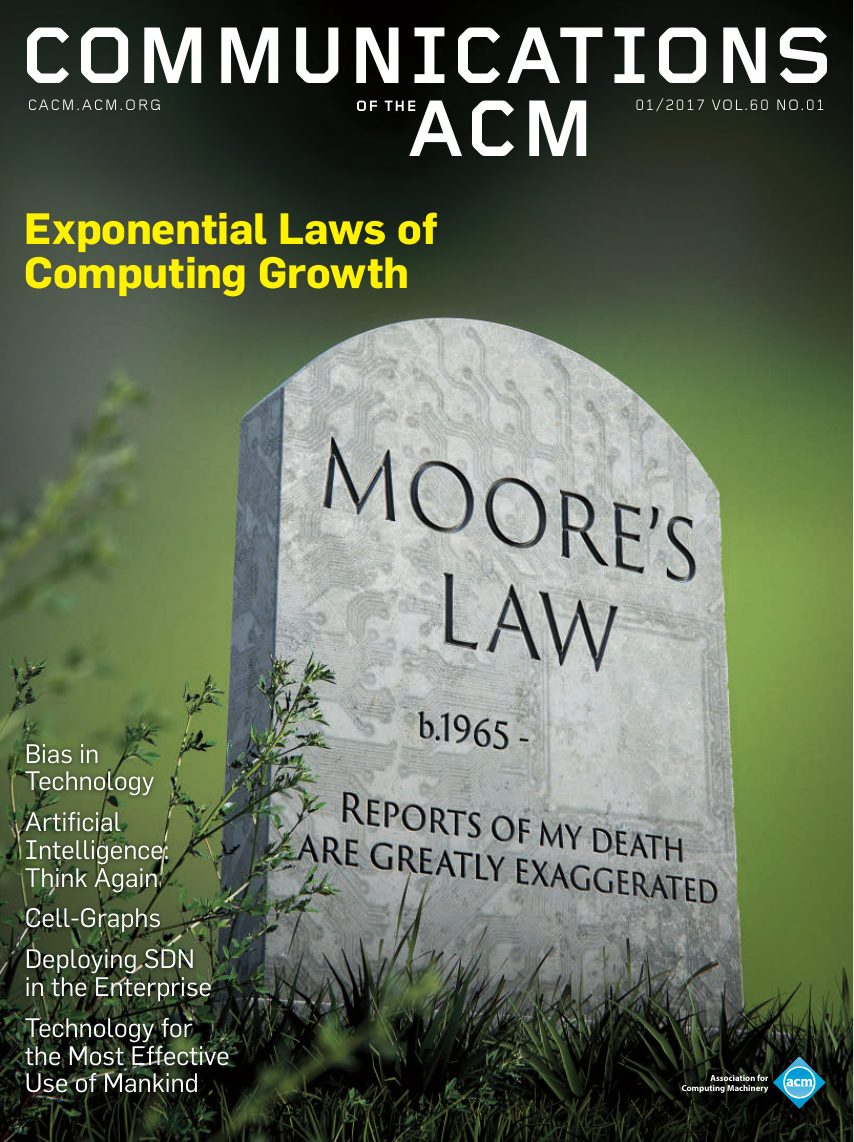
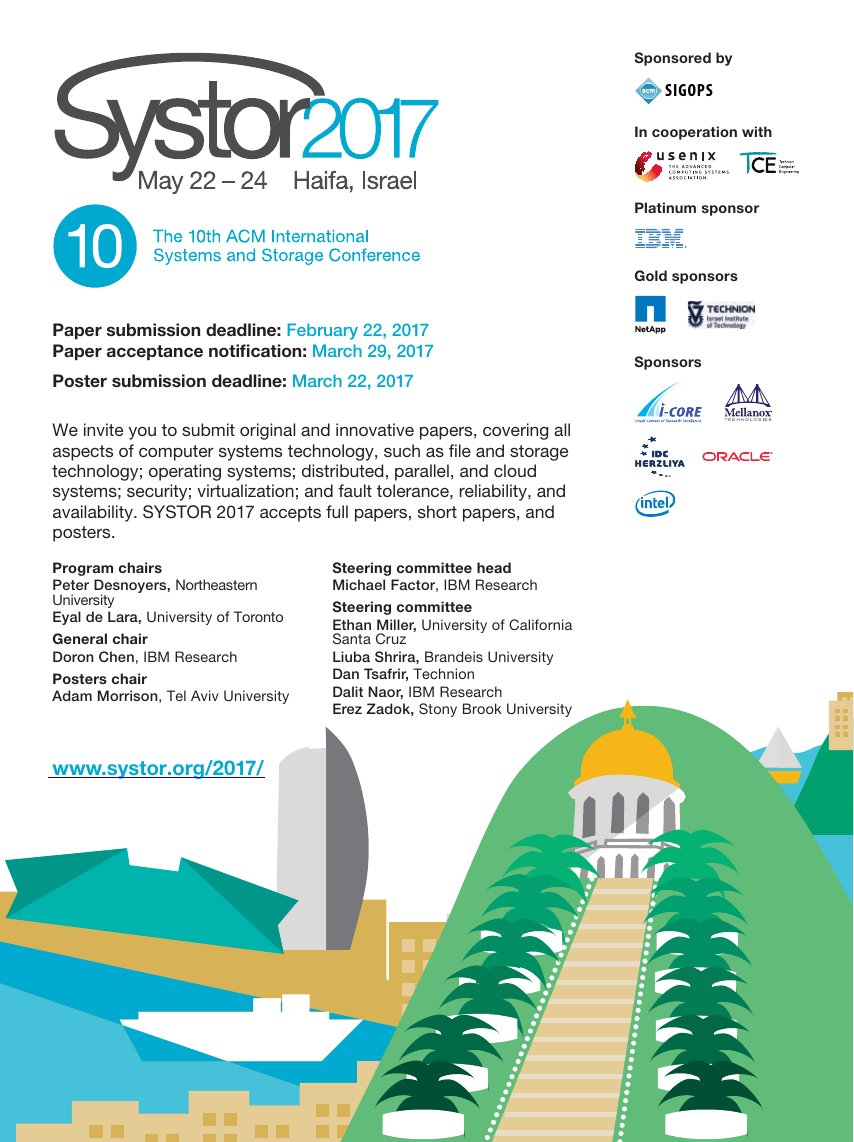
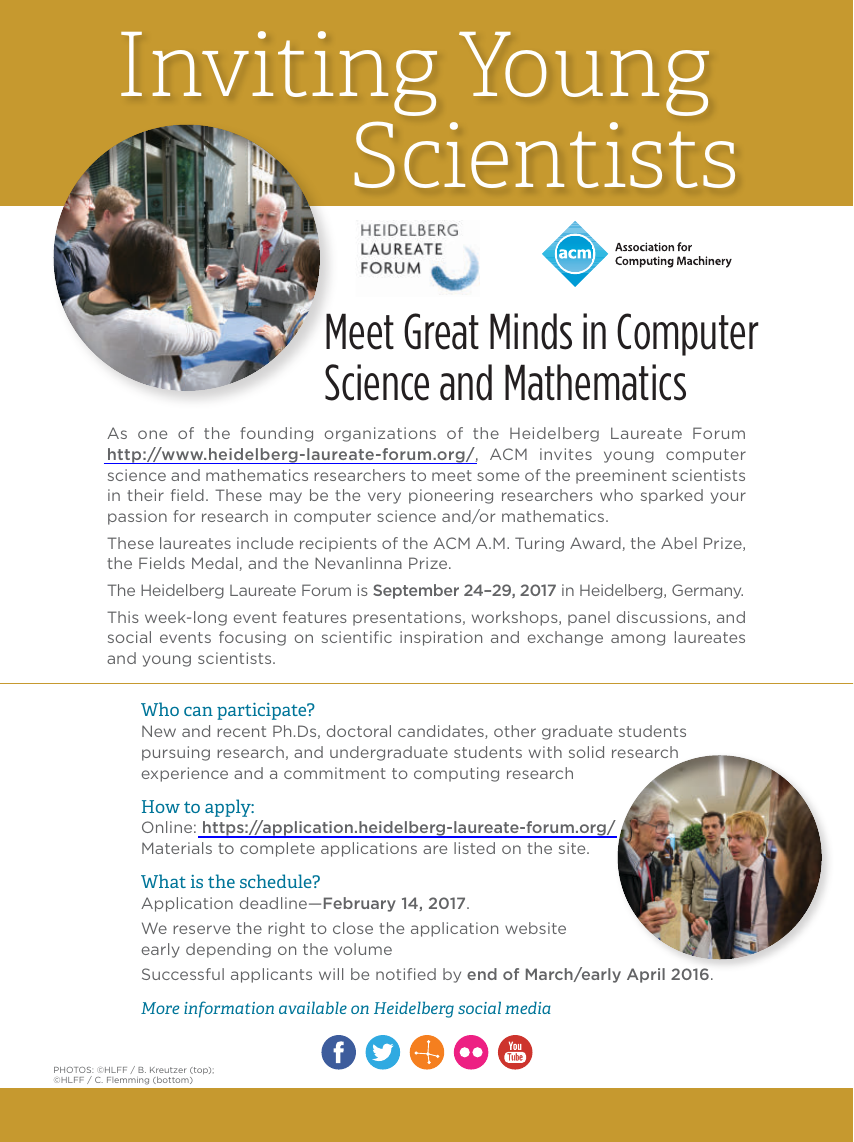
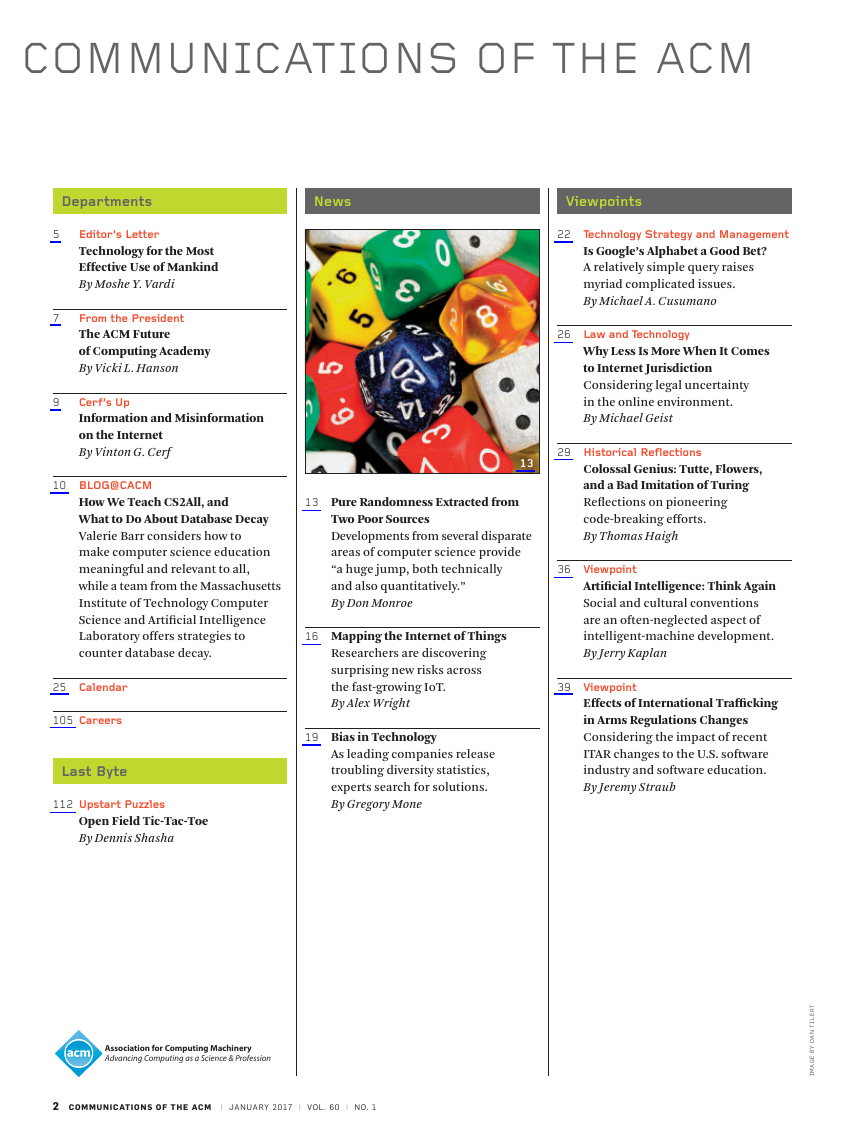
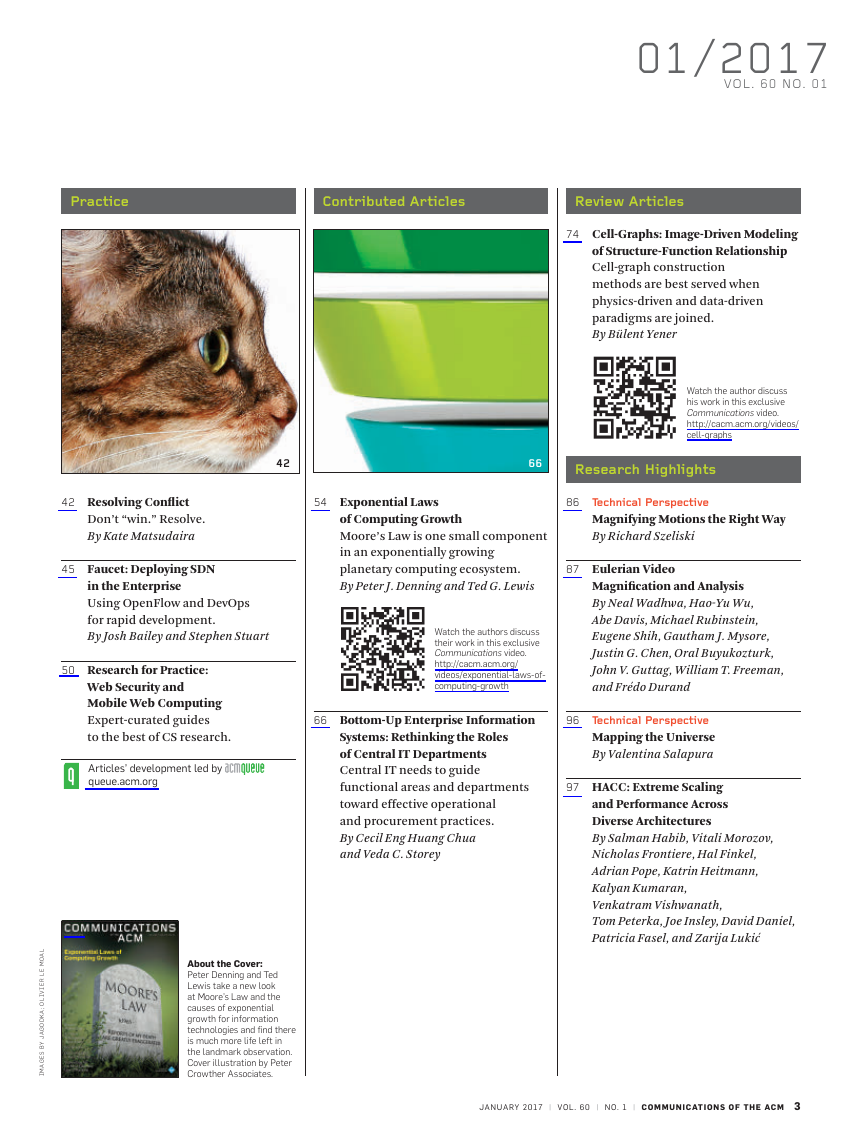
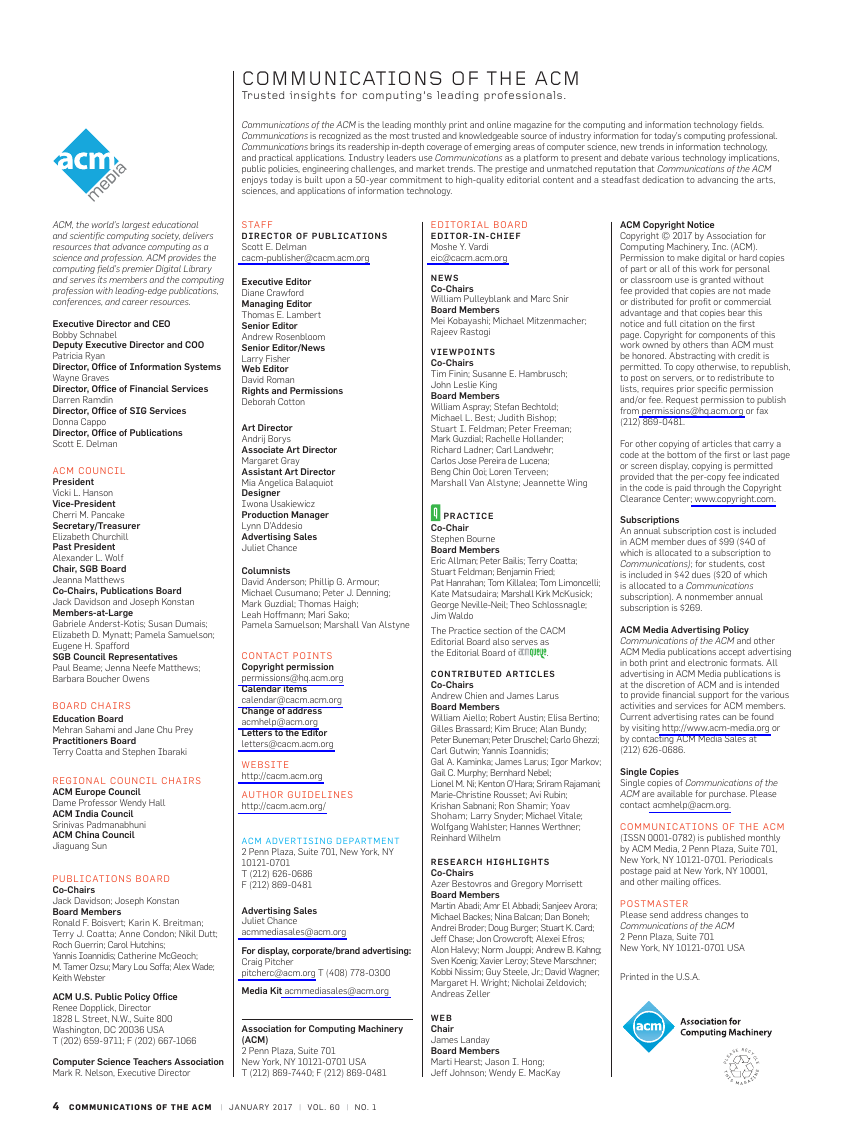

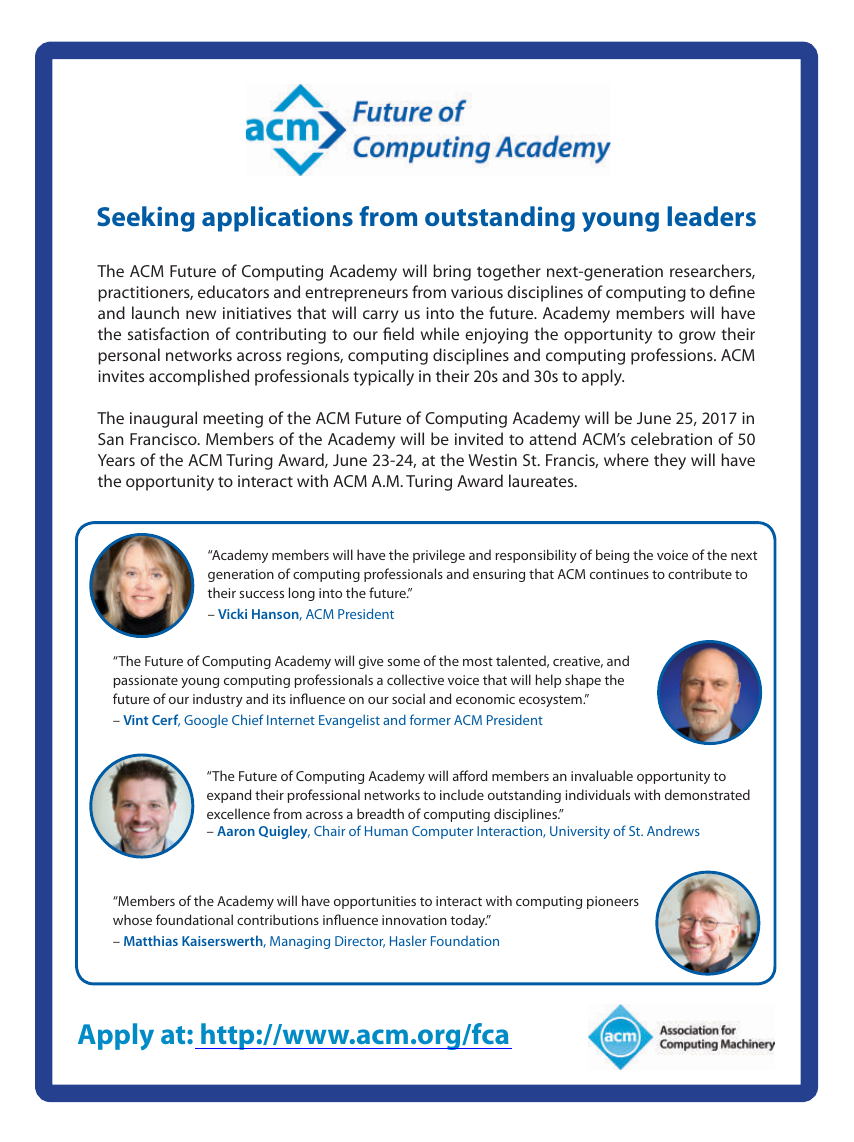








 2023年江西萍乡中考道德与法治真题及答案.doc
2023年江西萍乡中考道德与法治真题及答案.doc 2012年重庆南川中考生物真题及答案.doc
2012年重庆南川中考生物真题及答案.doc 2013年江西师范大学地理学综合及文艺理论基础考研真题.doc
2013年江西师范大学地理学综合及文艺理论基础考研真题.doc 2020年四川甘孜小升初语文真题及答案I卷.doc
2020年四川甘孜小升初语文真题及答案I卷.doc 2020年注册岩土工程师专业基础考试真题及答案.doc
2020年注册岩土工程师专业基础考试真题及答案.doc 2023-2024学年福建省厦门市九年级上学期数学月考试题及答案.doc
2023-2024学年福建省厦门市九年级上学期数学月考试题及答案.doc 2021-2022学年辽宁省沈阳市大东区九年级上学期语文期末试题及答案.doc
2021-2022学年辽宁省沈阳市大东区九年级上学期语文期末试题及答案.doc 2022-2023学年北京东城区初三第一学期物理期末试卷及答案.doc
2022-2023学年北京东城区初三第一学期物理期末试卷及答案.doc 2018上半年江西教师资格初中地理学科知识与教学能力真题及答案.doc
2018上半年江西教师资格初中地理学科知识与教学能力真题及答案.doc 2012年河北国家公务员申论考试真题及答案-省级.doc
2012年河北国家公务员申论考试真题及答案-省级.doc 2020-2021学年江苏省扬州市江都区邵樊片九年级上学期数学第一次质量检测试题及答案.doc
2020-2021学年江苏省扬州市江都区邵樊片九年级上学期数学第一次质量检测试题及答案.doc 2022下半年黑龙江教师资格证中学综合素质真题及答案.doc
2022下半年黑龙江教师资格证中学综合素质真题及答案.doc